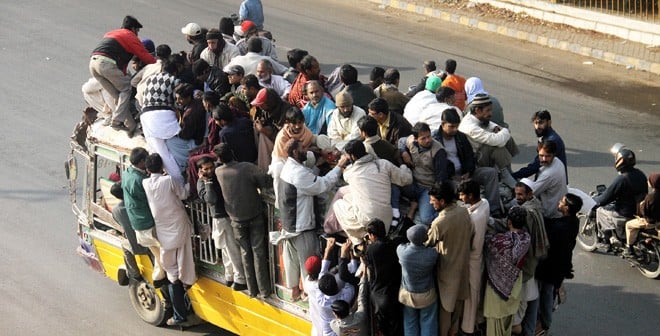
Family planning programmes will succeed only when the basic health and education systems are in place

World Population Day has rolled around again so let me contribute to the ritual annual noise-making and add my two bits to the clamour. I shall start with a basic question. Are there too many of us? Numbers can mean strength and people can be assets. We, however, seem to be increasing in numbers but not in strength and our people, rather than assets are becoming albatrosses around our necks.
The reason for this may be that we are unable to provide adequate basic rights and services to these people; education, health, shelter, protection, skills, jobs, water, electricity, and not even something as basic as food. As a result we have hordes of malnourished, stunted, illiterate, unemployed, frustrated and unhappy young people looking for avenues to vent their anger and energy.
Are we unable to provide for them because we do not have enough of the basic amenities they need or is it that we are not able to manage and distribute the resources that we do have equitably? It appears to be the latter. It is a convenient excuse to say that resources are limited and we are stressing them with an ever-expanding population. That is true to an extent but not completely.
Our problem is more one of inequality, injustice and misgovernance. A few possess assets worth billions while the majority of the people live below the poverty line. We have rivers and coal, sun and wind, but we are starving for energy and our industry stands crippled. We can be net food exporters yet our children die of starvation. This is so because our system is unjust and our priorities are skewed. They say the road to hell is paved with good intentions. Well ours has the additional fillip of having a metro bus to take us there on the fast track.
This brings us to the present crisis. With the present governance system and the existing rate of population growth, our metro is in for a bumpy ride. There are multiple human rights tragedies simultaneously unfolding all over the country even as these lines are being written. But these are silent tragedies, away from the glare of the media, without drama, without fuss or protest; Millions surrendering to their fates, living out lives of misery and want, and dying unknown, unacknowledged deaths.
Mothers dying in childbirth for want of maternal services, children dying of starvation, people dying of preventable diseases, youth being lured to terrorism and crime for lack of alternatives, children sold for money, fathers committing suicides because they cannot provide for their families.
Is having less children and smaller families a solution? It partly is. For a poverty stricken father it may make sense to have two instead of six children but that too is a tricky proposition. Will he and his wife get access to family planning services in his village health centre, will he be assured of timely treatment for his two children if they were to become ill, will he feel safe that his daughter will have a school with boundary walls and a toilet, will he be assured of a job that would provide for his small family?
If the state can provide these assurances then, yes it is a solution and it gives the government some relief as it has to provide for less people. But if he is not given these assurances and the current trends in government spending and public policies belie this, then it makes sense for him to have as many children as he can…to sell, to beg, to work in the fields, workshops and factories, to die and some to survive, to be camel jockeys or to be recruited by jihadis. They are his only assets.
So it follows that when the people have lots of children, they are making a rational choice; perhaps a cruel, unjust one, but nevertheless a rational one. They know that this choice may mean early death for the mothers, that some children may not survive, that it will be a struggle and a hand to mouth existence for all of them, but they accept that and still make the choice. They will make different choices when the government steps forward and is seen to be caring for them.
Family planning programmes will succeed when the basic health and education systems are in place. When men and women have livelihood opportunities, when girls go to schools and health centres are working, then families will voluntarily make the right choices for smaller or better spaced families.
The population issue is one of human rights and choices. If people, whatever their numbers, are provided their basic rights in a just, equitable system, when they are given access to high quality, efficient services they will make intelligent, rational choices. Maternal and infant mortality will decrease, literacy will go up, employment will go up, and yes the population growth rate will come down.
And then we can make a metro.